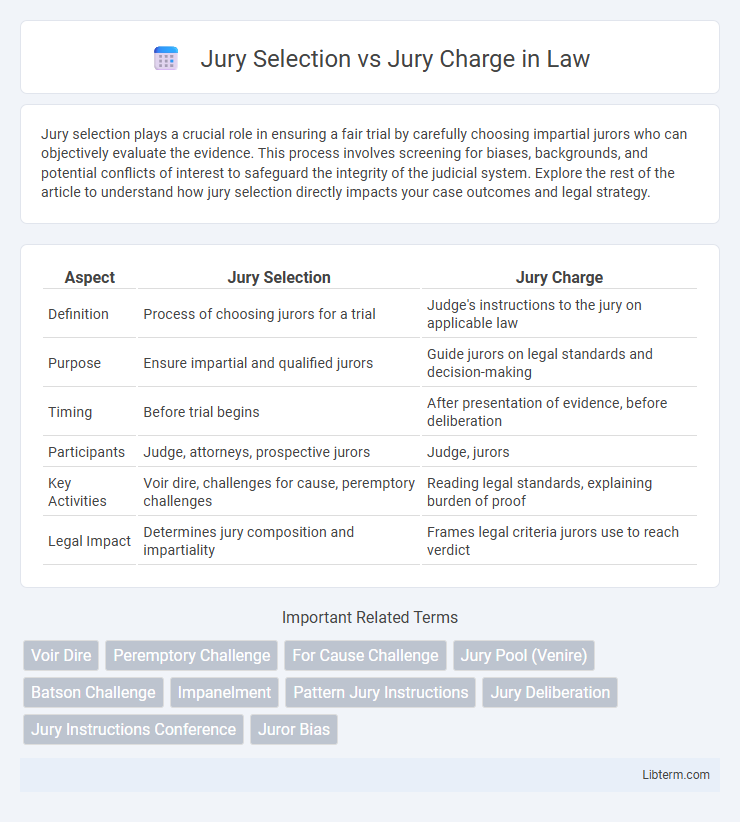Jury selection plays a crucial role in ensuring a fair trial by carefully choosing impartial jurors who can objectively evaluate the evidence. This process involves screening for biases, backgrounds, and potential conflicts of interest to safeguard the integrity of the judicial system. Explore the rest of the article to understand how jury selection directly impacts your case outcomes and legal strategy.
Table of Comparison
| Aspect | Jury Selection | Jury Charge |
|---|---|---|
| Definition | Process of choosing jurors for a trial | Judge's instructions to the jury on applicable law |
| Purpose | Ensure impartial and qualified jurors | Guide jurors on legal standards and decision-making |
| Timing | Before trial begins | After presentation of evidence, before deliberation |
| Participants | Judge, attorneys, prospective jurors | Judge, jurors |
| Key Activities | Voir dire, challenges for cause, peremptory challenges | Reading legal standards, explaining burden of proof |
| Legal Impact | Determines jury composition and impartiality | Frames legal criteria jurors use to reach verdict |
Introduction to Jury Selection and Jury Charge
Jury selection is the process of choosing impartial jurors through voir dire to ensure a fair trial by identifying biases or conflicts of interest. The jury charge, also known as jury instructions, is the judge's guidance outlining the legal standards and elements that jurors must apply when deliberating. Understanding both processes is crucial because jury selection shapes the composition of the jury, while the jury charge directs how jurors evaluate evidence and reach a verdict.
Defining Jury Selection
Jury selection is the process of choosing impartial individuals from a pool of potential jurors to serve on a trial jury, ensuring fairness in the judicial system. This phase involves voir dire, where attorneys and judges question prospects to identify biases, prejudices, or conflicts of interest. Effective jury selection impacts trial outcomes by assembling a balanced, unbiased group capable of delivering a just verdict.
Understanding Jury Charge
Understanding Jury Charge is crucial as it guides jurors on legal standards and how to apply the law to case facts. It involves the judge's clear instructions about relevant laws, burden of proof, and how to evaluate evidence. Accurate comprehension of the jury charge ensures fair deliberation and verdict consistency in trial outcomes.
Key Differences Between Jury Selection and Jury Charge
Jury selection involves choosing impartial jurors through voir dire, ensuring they can fairly evaluate evidence and deliver an unbiased verdict, while jury charge refers to the judge's instructions explaining relevant laws and legal standards jurors must apply during deliberation. The key difference lies in the timing and purpose: jury selection occurs pre-trial to form the jury panel, whereas jury charge happens post-trial to guide jury decision-making. Jury selection focuses on evaluating potential biases, whereas jury charge emphasizes legal clarity and accuracy to ensure proper application of the law.
The Role of Attorneys in Jury Selection
Attorneys play a critical role in jury selection by evaluating potential jurors' background, biases, and demeanor to ensure an impartial jury. They utilize voir dire to question and identify jurors who may favor or oppose their client, strategically exercising peremptory challenges and challenges for cause. This process directly influences trial outcomes by shaping a jury capable of fair deliberation based on evidence rather than prejudice.
Judge’s Role in Delivering the Jury Charge
The judge's role in delivering the jury charge is critical to ensuring jurors understand the legal standards and issues before them. This responsibility involves clearly explaining the applicable laws, defining key legal terms, and outlining the burden of proof necessary for reaching a verdict. Precise communication during the jury charge minimizes confusion and helps jurors apply the law accurately to the facts of the case.
Legal Standards Guiding Jury Selection
Legal standards guiding jury selection emphasize impartiality, ensuring jurors have no bias or conflict of interest related to the case. Voir dire is the primary process used by attorneys and judges to assess potential jurors' qualifications and suitability under the Sixth Amendment. Challenges for cause and peremptory challenges are mechanisms used to exclude jurors who fail to meet the established legal criteria for fairness and neutrality.
Importance of Proper Jury Instructions
Proper jury instructions are critical because they guide jurors in applying the law accurately to the facts presented during the trial, ensuring a fair verdict. Jury selection impacts who decides the case, but the jury charge ultimately shapes how the law is interpreted and understood. Misleading or unclear instructions can lead to wrongful convictions or acquittals, highlighting the vital role of precise and comprehensible jury charges in the justice system.
Impact of Jury Selection on Trial Outcomes
Jury selection plays a critical role in shaping trial outcomes by determining the demographic and psychological composition of the jury, which can influence decision-making patterns and biases. Effective jury selection strategies, such as voir dire questioning and the use of peremptory challenges, help attorneys identify favorable jurors and remove potential prejudices that could sway verdicts. Studies show that well-conducted jury selection correlates with higher conviction rates in criminal trials and more consistent verdicts in civil litigation, underscoring its strategic importance over the jury charge phase.
Consequences of Errors in Jury Charge
Errors in jury charge can lead to significant legal consequences, including the potential for a verdict to be overturned on appeal due to misguidance of jurors. Unlike jury selection, which focuses on ensuring impartiality and fairness in the composition of the jury, jury charge errors directly impact the jurors' understanding of the law and case instructions. Such mistakes may result in retrials, increased litigation costs, and a heightened risk of wrongful convictions or acquittals, underscoring the critical importance of precise and accurate jury instructions.
Jury Selection Infographic

 libterm.com
libterm.com